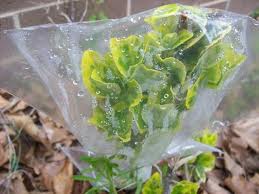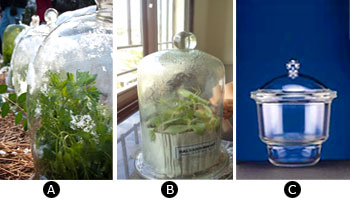Experiment 1:

Take a medium–sized well–watered potted plant. Cover the plant with a transparent polythene bag and tie its mouth round the base of the stem. Leave the plant in sunlight for an hour or two. Drops of water will soon appear on the inner side of the bag due to the saturation of water vapour given out by the leaves. A similar empty polythene bag with its mouth tied and kept in sunlight will show no drops of water. This is a control to show that plants transpire water in the form of vapour.
Experiment 2:

Arrange three set-ups A, B and C as follows:
Set-up A: Take a small well–watered potted plant, preferably one with broad leaves. Enclose the pot completely within a polythene bag and tie the mouth of the bag firmly round the base of the stem. This would prevent the escape of water vapor from the pot. Now cover the entire plant under a bell jar as in (A).
Set–up B: Arrange another similar plant and cover it with a bell jar exactly in the same manner as the first one, except that here you also keep a piece of dry cobalt chloride paper by the side of the plant inside the bell jar (B). The paper may be pinned to a wooden stick or to a strip of cork sheet.
Set-up C: Take a third bell jar without the plant, but still containing a similar piece of cobalt chloride paper (C). Now, keep all the three bell jars together in the sun.
After about half an hour:
- The first bell jar (A) would show water vapor condensing on its inner walls.
- The second bell jar (B) would also show a similar condensation and at the same time the initially blue cobalt chloride paper in it would be pink.
- The blue color of the cobalt chloride paper in the third bell jar (C) does not change at all and there are no water drops on the jar's inner walls either.
- The third bell jar in this experiment is a control which proves that there was no moisture in the air.
By taking the three bell jars as described above, there is a double visual proof of transpiration:
- Condensation of water vapor
- Change of color in cobalt chloride paper. You may simplify the experiment either by taking (B) and (C) only, or by taking the bell jar A and another empty bell jar without the plant or the paper.